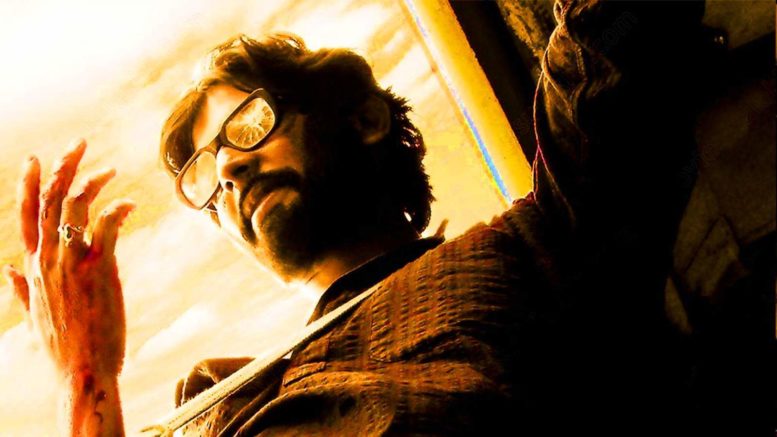Ram’s incisive directorial debut, “Kattradhu Thamizh,” delves into the relentless conflicts between capitalism and socialism, sciences versus arts, and the encroachment of foreign languages over native tongues. As the world undergoes rapid socioeconomic changes, this film confronts these battles fueled by evolving dynamics.
The narrative unfolds as a visceral exploration of globalization, the first installment in Ram’s thematic trilogy (including “Thanga Meenkal,” 2013, and “Taramani,” 2018). The film’s tone oscillates between anger, melancholy, and controversy, offering a canvas open to diverse interpretations.
Stepping away from the societal lens, this analysis delves into the film’s spiritual quest, acknowledging the myriad perspectives that can shape one’s understanding. “Kattradhu Thamizh” emerges as both personal and political, with its greatest strength lying in the universal battle between life and death, echoing existentialist themes that mirror broader societal angles explored in the film’s layers.
LIFE AND DEATH
“Kattradhu Thamizh” intricately weaves the struggle between life and death, damnation and deliverance, into the core of its narrative. It unfolds as an intimate chronicle, offering a glimpse into the traumatized existence of Prabhakaran (Jiiva), the protagonist and narrator. Prabhakaran’s candid monologues, directed either to his absent Anandhi or recorded for sharing, become windows into his collapsing world.
An Intimate Chronicle of Trauma
As a postgraduate in Tamil literature, Prabhakaran confesses to being a murderer, setting the stage for a gripping tale of evasion, not just from the law but from death itself. The looming presence of death, embodied by menacing ghosts, guides the course of Prabhakaran’s journey, leading him back to a destiny steeped in damnation.
The film opens with Prabhakaran’s desperate suicide attempt, an elaborate performance atop a building where he passionately recites a Tamil poem. This poignant moment becomes a reflection on his drastic decision, offering viewers a glimpse into the intricate layers of his troubled psyche.

Evasion of Damnation
Navigating the realms of death and salvation proves elusive for Prabhakaran, defying a simple leap or fall. In his final bid for release, he is thwarted by powerless electric wires during a blackout, leaving him suspended between life and death. The missed opportunity for ‘moksha,’ ultimate salvation, fills him with regret and self-blame. His encounters with death have never been serene; instead, they unfold in daunting spirals, haunted by an early curse.
At the tender age of ten, Prabhakaran faces his first grim encounter with death when his beloved pet dog Tony meets a tragic end beneath a relentless train. The trauma originating from this incident casts a pervasive shadow over his life. Subsequently, a fatal car wreck claims the lives of his mother and grandparents, plunging him into the harrowing proximity of death’s visceral reality. With a father in the military, the perpetual battle between life and death becomes a recurring theme, perpetuating the damnation that begins to trail Prabhakaran.
Candid Narratives
As a 26-year-old, he remains haunted, his trembling voice bearing witness to the invasion of death into his life. Unveiling an old set box from Tony’s tragic incident, Prabhakaran still carries the baggage of trauma. Introducing himself to Anandhi’s mother and others from his past, he intertwines his identity with death, narrating his name alongside his mother’s demise. The narrative reveals a profound connection between Prabhakaran’s identity and the deaths that have shaped him.

Amidst this crushing damnation, Prabhakaran discovers his liberation, his escape from the ghosts of death in three phases and in three forms.
The initial solace for Prabhakaran arrives through his fatherly Tamil teacher, Azhagam Perumal, who fosters a love for Tamil literature and nurtures his childhood affections. Perumal becomes a healing presence, briefly rescuing Prabhakaran from the clutches of trauma. Within the cherished set box, alongside memories, lie delicate white feathers gifted by Anandhi (Anjali), his childhood love. Although these feathers don’t transform into wings, they symbolize moments of happiness, reminiscent of a fluttering butterfly in the company of his mentor.
Metamorphosis in Music: Yuvan’s ‘Para Para Patampoochi
Yuvan’s enchanting “Para Para Patampoochi,” echoing through Prabhakaran’s joyous days with his Tamil teacher, foreshadows a similar metamorphosis. Prabhakaran’s mentor, intimately connected to his own childhood, displays a poignant devotion by writing to his 7th grade love, a stark contrast to the torment-free aspects of his own past. However, this idyllic phase shatters in the face of Prabhakaran’s harsh realities.
The specters of death return as the curse persists in its relentless pursuit. The demise of his Tamil teacher marks a profound turning point, leading Prabhakaran to his second, more profound source of deliverance. Reunited with Anandhi outside a mortuary, both grieving the loss of fathers, they seek solace in each other. Anandhi’s life is marred by death as well, having witnessed the tragic demise of their beloved dog Tony and facing societal rejection as an illegitimate child after her father’s death. The lovers find refuge in each other, transported to the carefree days of their early years, where death, curses, and trauma were yet to cast their shadows. Even in their dreams, death’s ominous presence lingers, intertwining with the playful chronicles of their childhood.
Tragic Turns: Death’s Relentless Pursuit
The ultimate means of deliverance for Prabhakar takes a dark turn, manifesting in the form of violence. Faced with suffocation and a loss of honor in the harsh urban landscapes of Chennai, Prabhakar grapples with daily challenges that deny him not only survival but any chance at redemption. The city, portrayed as lacking poetry and soul, becomes a breeding ground for inhumanity, highlighting the ongoing theme of urbanization versus nature in Ram’s works, notably in Taramani and Peranbu.
Ambiguity in Confession: Prabhakar as a Shameless Liar
In Kattradhu Thamizh, trains symbolize terror and death, serving as catalysts for Prabhakar’s despair. His initial contemplation of suicide is triggered by a confrontation with an old friend on a train, and both of his murders take place in train settings. Trains, once forces of terror, become a tool for Prabhakar to confront and control the ghosts of death that have haunted him throughout his life.
Dostoyevskian Echoes: Consciousness of Degradation
Drawing inspiration from Dostoyevsky, a prominent existentialist, Prabhakar’s extreme form of deliverance is expressed through the ecstasy of intense self-awareness amid degradation. The act of murder becomes a way for him to assert control over the relentless pursuit of death that has defined his existence. However, Prabhakar’s own admission of being a shameless liar adds a layer of ambiguity to his killing spree, raising questions about the authenticity of his claims and the true nature of his actions.

The only moment in the film when the train moves toward salvation, emerging from the tunnel’s darkness into the light, is when Prabhakar embarks on a journey to find Anandhi in the deserts of Maharashtra. This phase marks one of the most poignant stretches in the film, with Prabhakar fondly engraving her name on the train. The hauntingly beautiful and soulful music resonates strongly with the fleeting nature of joy in Prabhakar’s life, making “Innum Or Iravu” a singular psychedelic chronicle of damnation.
Musical Odyssey of Deliverance: Unveiling the Soulful Notes of “Kattradhu Thamizh”
The other three songs, fleeting bursts of bliss, pause in the midst of trauma: the nightmare in “Para Para Pataampoochi,” the loss of the beloved Royal Enfield bike in “Unakkagathaney,” and the poignant lovers’ conversation in “Paravaiye Engu Irukirai.” The theme of deliverance is deeply embedded in Na. Muthukumar’s lyrics, expressing Prabhakar’s profound desire to be liberated from the curse. Lines like ‘Thaneeril mithakum erumbuku ilai padagu aaanathey’ (The leaf becomes a lifeboat to a little ant flailing in the waters) from “Para Para Pataampochi” embody this theme.
Cave of Redemption: The Culmination of Prabhakar and Anandhi’s Tragic Saga
In “Unakkagathaney,” the lines convey the yearning for deliverance: ‘Oru murai, oru murai nee sirithal, naan vaazhavthu artham aagum. Maru murai, maru murai nee sirithal, intha jenmathin saabam theerum.’ (If you will smile once, a new meaning enters my life. If you will smile again, my life shall break free from the spell of curse). The desire, briefly realized in “Paravaiye Engu Irukirai,” brings forth the lyrics, ‘Muthal murai vaazha pidikuthe, mudhal murai velicham pirakuthey, mudhal murai murindha kizhai ondru pookuthey’ (For the very first time, I am joyous of feeling alive, a new light shines on my life, and this broken branch blossoms.)
Weaving Joy and Sorrow
An evocative detail lies in Anandhi cleaning Prabhakar’s large spectacles, symbolizing the distortion of his once innocent vision. Destiny unites the lovers in a brothel, offering them the last hope of salvation. Anandhi becomes a divine piece of god for Prabhakar, magically turning him into a seven-year-old boy, oblivious to death and the world’s harshness. The lovers reach the cursed cave, embracing it as the final dreadful deliverance from their damned destinies. In a voiceover, Ram suggests that visiting Acchankovil might reveal the seven-year-old Prabakar and Anandhi, happily running with shining lamps, as their Tony hops behind them.



Be the first to comment on "Ghosts of death in Ram’s Kattradhu Thamizh"